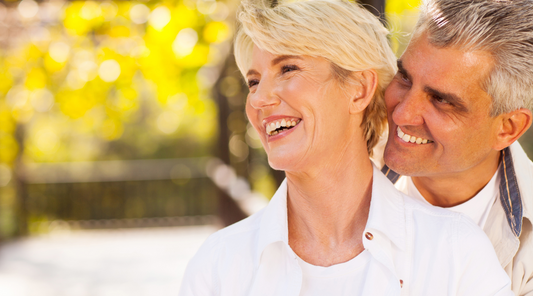True or False?
- Our sex lives become non-existent during and after menopause.
- If we don’t feel like having sex, our relationship must be dead.
- We can’t fight Mother Nature…as we age we lose our ability to feel sexy.
To all of these, I say…100% FALSE.
Yikes…my opinion is that any couple can have more fulfilling intimacy and a satisfying sex life – at any age (even after menopause) …
It is so typical, however, that couples spend more time working on home improvement projects, updating all of their social media accounts or perfecting their golf game versus working on maintaining or improving their own sex lives!
Maybe YOU are “explaining” your sexless marriage or stalled relationship away by telling yourself…
“Maybe it’s because…”
- You are stressed out due to your job, caregiving demands, family responsibilities or your suddenly empty nest.
- You’re just too tired these days.
- Sex just hurts now.
- You’re feeling overweight and less than desirable.
- Your partner doesn’t seem to initiate anything either!
- The new television season just sounds way more fun (and easy)!
If any of these sounds like your self-talk, it’s time to do something about it. It isn’t difficult, it is just like any HABIT…you need to break the bad ones, and start a few NEW, healthier ones.
So here are THREE steps that will help you get out of the “roommate” mode and back sharing intimacy and connecting as soulmates once more.

Step #1: The importance of getting rid of the physical barriers to intimacy
Feeling more like roommates these days? It likely isn’t a lack of desire on either of your parts (and it really isn’t the new television season line-up). In more cases than not, your lack of intimacy and connectedness is a result of diminishing sex hormones that you are both probably experiencing; as well as how that hormone imbalance makes you both feel, physically and emotionally.
Falling levels of estrogen can reduce desire in women and can affect vaginal lubrication, making our “V” feel dry and uncomfortable during sex. Who wants to have sex if it hurts?
Don’t forget that men suffer from testosterone decline and other hormone imbalances as they age, too…causing erectile problems, fatigue and libido decline.
Depleted testosterone is also a female issue; along with naturally diminishing DHEA hormone levels, both contribute to a woman’s loss of libido as well as affecting vaginal muscle and tissue integrity.
All of this hormonal change can cause many other discomforts and humiliations (nothing sexy about vaginal odors and discharges, urinary tract infections or accidental urinary leakage…did you know that today almost 70% of women use period-specific products for leakage purposes??? This is unfathomable!).
In my Eve Quiz (a survey of thousands of women talking about their sexual health)
▪ 70% of women said they had issues with arousal.
▪ 64% of women had troublesome vaginal or vulvar dryness.
▪ 62% of women noted some discomfort during or after sex.
▪ 70% of women said they had experienced urinary leakage when coughing, sneezing and the like.
But YOU can choose to improve upon these symptoms and achieve satisfying and pain-free sex.
Here are a few simple things you can easily start today to focus on the physical barriers to enjoying your partner:
- Remember that vaginal dryness is not necessarily related to turn on. This is important for both of you to understand so as not to feel guilt or shame. Most of the Eve Quiz’s non-libido-friendly symptoms can be corrected with a little help. Use natural lubricants to address dryness and pain.
- Remember that gravity is working against you! A strong pelvic floor can prevent incontinence and vaginal prolapse, as well as heighten your sensitivity during sex. Kegel exercises are just one way to defy gravity’s impacts, and there are right ways and wrong ways to do them. Research has shown that age is no barrier to improving pelvic floor health.
- To strengthen and improve vaginal tissue, try using a restorative cream like Julva® which includes natural nourishing ingredients as well as DHEA (shown in the research to reduce dryness, improve libido and orgasms…and just as importantly improve issues with urinary leakage).
- Feed your (and your partner’s) libido more nourishing food! Remember that what you eat can also affect those negative Eve Quiz symptoms! Eating a healthier Keto-Green® diet will help with hormone balance, keep you at a healthy weight, and nourish your gut (I view the “V” as a part of the gut, by the way!). Eating Keto-Green will improve your and your partner’s energy, mood and libido! My Keto-Green lifestyle also includes a focus on stress management, improving sleep, and much more…all-important to improve hormone balance and to remove the physical barriers to intimacy.
Addressing physical symptoms can help you feel sexier and will naturally lead to more desire. Helping your partner balance his hormones is helpful as well. But we also need to focus on what’s going on in our (and our partner’s) mind…that is often even more of an impact than physical barriers!

Step #2: Ensure more emotional orgasms!
Some of the common emotional concerns that I hear from women are:
- It’s just challenging for me to get things started!
- I don’t know how to tell my partner/spouse about how my symptoms are affecting my everyday life and enjoyment of sex!
- I routinely fake an orgasm just so my partner/spouse doesn’t feel bad.
- I don’t know how to tell my partner/spouse what I want!
- I don’t think I even know what I want!
It’s no wonder a high number of women never climax, and many don’t climax during intercourse. And important for our partners to know and understand, many women do not experience vaginal types of orgasms (as defined by Masters and Johnson) but instead require clitoral stimulation.
The last statistic I saw about this was that about 10-15% of women never experience climax, with about 25% of women not experiencing climax during intercourse. And that is based on what women admit to! Previously in my medical practice – and now with many clients – I hear from many women, especially as they age, that they have just given up on their own sexual enjoyment. While they may still have occasional sex, they do it for their partner, versus to achieve pleasure themselves. In my newly relaunched program, Sexual CPR, I talk about this and give you guides and secrets to connecting with your partner. Download the free ebook, Arousal Secrets here.
This is telling, in my opinion. I think women find it difficult to focus on themselves, their own needs. I’ve had many women tell me they fake orgasms so that their partners feel like they’ve performed well. So think about that for a moment. If our partner is doing something that isn’t working, yet we fake an orgasm, doesn’t that simply reinforce what our partner was doing?
I also think that most women need an emotional piece to enjoy sex, the intimacy…versus just the physical act. So women need much more out of “sex” than what they may get – unless they ask. Many women I’ve worked with have told me that they feel like if they have to ask that there is something wrong with them! Or if vaginal sex doesn’t do it for them, there must be something wrong with them!
So many never ask for something different (nor do they always know specifically what they WOULD ask for, anyway!).
That’s why I always say…
Sexy self-discovery versus negative self-talk is required at this time!
I have found there are many emotional inhibitors to enjoying sex, everything from religious views to having kids in the house…to not trusting your partner…to feeling fat and undesirable… while I can’t cover addressing all of these emotional barriers here I can provide you a few tips.
- Ask yourself, in a perfect world…where and when would you want to spend intimate time with your partner if you could write the scene? (remember I’m not necessarily talking about sex here, it could be cuddling, a massage, or just holding hands and talking over a glass of wine) At home? (bedroom or living room/in front of a roaring fire) A hotel? Outside? At the beach? Morning? In the afternoon? In the hot tub? It’s important to get a sense of when/where you’d feel safe, undistracted, relaxed and sexy. Sometimes we get into a bad habit of “only having sex” at certain times in our bedroom, with no spontaneity allowed.
What’s happening in the perfect scene? Your answer may surprise you and your partner!
- Learn to pamper yourself before you share those learnings with your partner: a little self-exploration is a wonderful thing. What makes you feel relaxed…what turns you on….what makes you orgasm? I find that many women never focus on what turns THEM on; instead many focus solely on their partner’s sexual gratification. The problem with that is that men tend to be climax oriented while we women love foreplay, romance, cuddling…need I say more? We need these things to make us feel what I call, Emotional Orgasm! Women can experience emotional orgasm (sexual satisfaction and bonding with their partner) without truly physically climaxing.
- Your partner can’t read your mind….really! I know it’s often hard to communicate with our partner what we need. It makes us feel vulnerable, or perhaps silly, or worse, it may make us feel critical. Especially if we are asking for something NEW (or asking him to stop something he has been doing for years!), we may think our partner will react negatively or with hurt feelings. I think this can be more tenderly addressed by explaining to our partners what WE ARE GOING THROUGH ourselves, with perimenopause or menopause. They really may not understand the depth of our symptoms. While they may have figured out your hot flashes are due to menopause it is helpful for them to know that your hormone issues are also impacting your mood, your brain, your physical ‘V” symptoms, and your libido (and that they are in no way to blame). In the same token, talking about common hormone imbalance/symptoms in men can take some of the pressure off of our partner as well. During this discussion, if you are lucky, you may also gain some insights into what your mate might find energizing, as well.

Step #3: Commit to “Couple’s 101”
Women really need to communicate that intimacy is important to their ability to have an emotional or physical orgasm. “Intimacy” consists of all of the pleasurable moments with your mate that is not necessarily tied to having intercourse. While intimacy may lead to that, there shouldn’t be an expectation that it must. This may need to be communicated a few times to your partner and needs to be continually positively reinforced!
Most of you have probably heard the phrase, “Don’t invest and forget.” It’s often used to talk about how many people make financial investments and then somewhat neglect them as an ongoing, everyday priority. I think of relationships and intimacy that way, you can’t just “buy-in” to a relationship and then forget about it. It needs to be tended to and nourished. It needs to be a constant priority on our very long list of priorities. Many of us get distracted by life and our everyday issues as well as getting distracted by all the noise (of social media, the news, etc.).
But we need to prioritize intimacy. Intimacy keeps us connected, may lead to emotional orgasm or even physical sex! You’ve heard of “use it or lose it?” Well, what you’ll likely find is if you use it you will experience more of it!
So what is your perfect intimate moment? Here are a few that I recommend:
- Share small, spontaneous moments together (going on a walk, going to a local art and wine fair or park, going out for coffee rather than you each drinking from the Keurig at home - in front of your computers, etc.)
- Hold hands or exhibit other public affection…nothing says, “you’re mine” like a touch, embrace or kiss in public!
- Let your partner know they are on your mind (text your spouse during the workday just to say you love them...or something spicier).
- Plan a romantic getaway (this can be at the Inn around the corner!) If you have caregiving or family responsibilities, work out babysitting or substitute caregiving coverage.
- Watch a favorite movie together snuggled up under a shared blanket.
- Back rubs or lingering in the hot tub with a glass of wine or favorite drink.
I know of a friend who always kisses her husband the moment he comes home from work, and if she is around when he leaves in the morning, she kisses him goodbye.
Who out there even greets their spouse when they come home each day? Many of us do not. Yes, there are so many SMALL YET IMPACTFUL ways to create intimacy and connectedness that don’t require sex.
For additional insights into what you can do to keep out of “roommate mode” and connect again with your mate, join us in our re-launched program, Sexual CPR!
Remember, age has nothing to do with having a fulfilling relationship with both intimacy and great sex.
Don’t invest and forget…just like with our finances, neglecting intimacy with our partner can result in significant loss and unhappiness!
P.S. If you’re dealing with common “V” issues...
Like vaginal dryness and discomfort during intercourse, you can typically turn to temporary topical treatments, like moisturizers and lubricants. Julva®, my anti-aging cream formulated for delicate skin is an excellent option!





